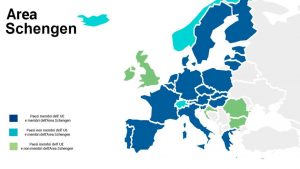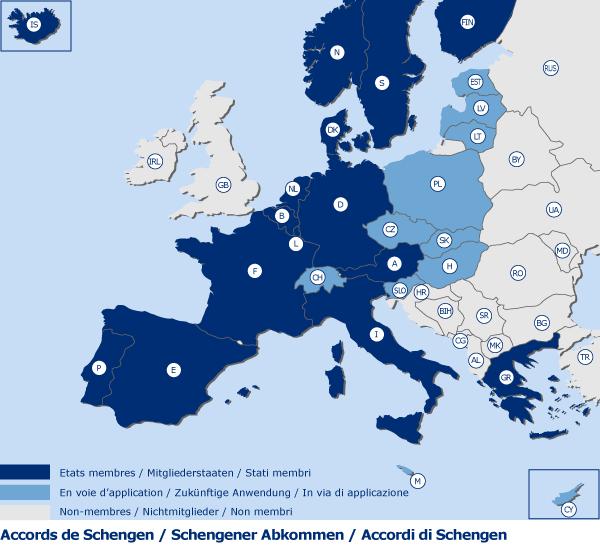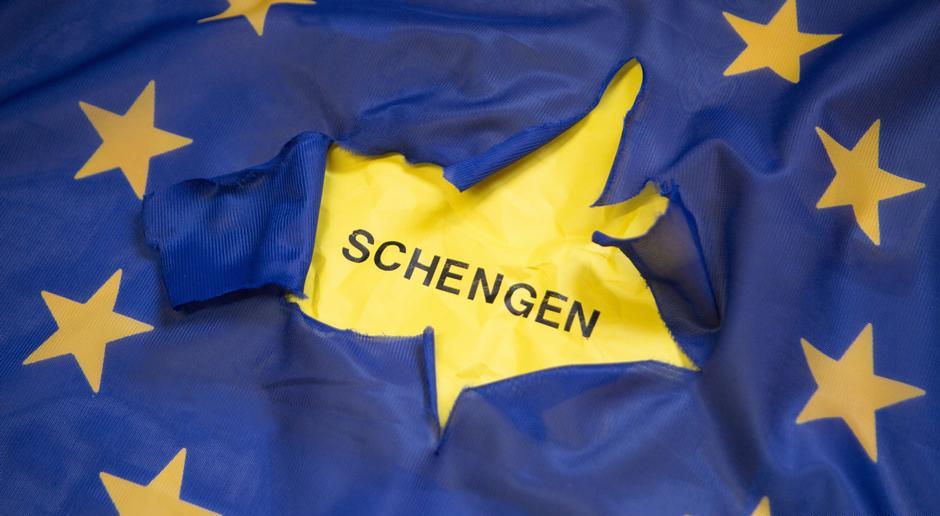With the Schengen agreement, Belgium, France, Germany, Luxembourg and the Netherlands have decided to progressively eliminate internal border controls and to introduce freedom of movement for all citizens of signatory countries, other EU countries ( EU) and some third countries.
CONDITIONS FOR THE ENTRY OF FOREIGNERS IN ITALY
Entry into Italy of foreigners coming from outside the Schengen area is allowed only to foreigners who:
a) present themselves through a pass border;
b) is in possession of a valid passport or other equivalent travel document, recognized by the Italian Government for crossing borders (this document must allow the owner, at any time, free return to the country of issue).
c) has documents that justify the purpose and conditions of the intended stay and proves to have sufficient financial resources in relation to the nature and duration of the planned stay and the costs of returning to the country of origin or transit to one Third State (the alien already residing in the territory of one of the Contracting Parties and having a valid authorization to stay is exempt from this demonstration);
d) if required, it must be provided with a valid entry or transit visa. (NB: for stays not exceeding 3 months, the foreigner already residing in a Schengen state with a valid residence permit is exempt from visa; for Italy, this exemption does not apply if entry takes place for "subordinate work" reasons , "Self-employment" or "internship");
e) is not reported for non-admission purposes;
f) is not considered dangerous for public order, national security or international relations of one of the Contracting Parties by national or other Schengen states.
The sanction for the absence of even one of the aforementioned conditions is the refoulement of the foreigner, which can be implemented by the competent Border Authorities even in the presence of a regular entry or transit visa.
"Non-foreigners": the citizens of the 18 countries belonging to the "European Economic Area" (EEA), which includes the 15 members of the European Union (Austria, Belgium, Denmark, Finland, France, Germany, Greece, Ireland, Italy, Luxembourg, the Netherlands, Portugal, the United Kingdom, Spain and Sweden) plus the 3 equivalent to them (Iceland, Liechtenstein and Norway).
"Foreigners": citizens of all other countries.
"Schengen area": all the national territories of the 15 countries that apply the Convention (Austria, Belgium, Denmark, Finland, France, Germany, Greece, Italy, Iceland, Luxembourg, Norway, the Netherlands , Portugal, Spain and Sweden).
"External frontier": the external perimeter of the Schengen area from which the foreigner can enter the border crossing points, namely the land and sea borders, as well as the airports and seaports of the Contracting Parties, which are not internal borders (it is to be considered an "external" flight any flight from or exclusively destined for third country territories).
A) BORDER VALUES
Any citizen of one of the Contracting Parties, or a foreigner already coming from a location within the Schengen area, can therefore cross the Italian internal border anywhere, without any control of the persons.
From a location outside the Schengen area, on the other hand, if a non-foreigner enters Italian territory, he is subject to citizenship control only; but if a "foreigner" is entering, he is subject, before entry, to all the eligibility checks carried out by the border Authority.
"Internal borders": the borders that the aforementioned 15 countries have in common within the Schengen area, namely their common land borders, their airports used for internal traffic, their seaports for regular passenger connections from or exclusively to other ports located in the territory of the Contracting Parties, without a stop in ports located outside these territories "(it is to be considered an" internal "flight any flight exclusively from the territories of the aforementioned Contracting Parties or with exclusive destination to they, without landing on the territory of a third State).
B) PASSPORTS AND OTHER EQUIVALENT TRAVEL DOCUMENTS
For entry, stay or transit throughout the Schengen area, foreigners must be in possession of a passport or other recognized travel document valid for crossing the borders from all Contracting Parties.
1) Passport
It is the internationally recognized document that enables the holder to travel from one country to another. It can be: diplomatic, service (or official or special or for public affairs) or ordinary; individual (with the possible registration of the spouse or minor children) or collective (registered in groups of not less than 5 and not more than 50 people, all having the same citizenship and all traveling together and for the same purpose, usually tourist ; if it does not contain photographs of travelers, the members of the group must also be provided with a personal identity document with photo).
2) Travel documents equivalent to a passport.
C) AVAILABILITY OF FINANCIAL SUBMISSIONS
The availability of financial resources can be demonstrated not only by showing cash, but also by bank guarantees, insurance policies or equivalent credit instruments, prepaid services or acts proving the availability of income sources in Italy.
Except in cases where it is otherwise provided for by the aforementioned rules, the foreigner "must indicate the existence of a suitable accommodation in the national territory and the availability of the sum required for repatriation, even with the exhibition of the return ticket" .
TABLE FOR THE DETERMINATION OF THE MEANS OF SURVEY REQUIRED FOR ENTRY INTO THE NATIONAL TOURISM TERRITORY
D) VISAS
The visa, which consists of a special "sticker" (or "sticker") applied on the passport or other valid travel document of the applicant, is an authorization granted to the foreigner to enter the territory of the Italian Republic or in that of other Contracting Parties for transit or stay, to be assessed in light of needs connected with the good progress of international relations and with the protection of national security and public order.
As a rule, there is therefore no foreigner's "right" to obtain a visa, but at most a simple "legitimate interest"
The visa does not guarantee absolute entry, since the Border Authority can always reject the foreigner, if he has no means of subsistence and is not able to provide exhaustive indications about the modalities of his stay in Italy or for reasons of security and public order.
Every "foreigner" who legally enters Italy - whether visa-exempt or subject to a visa - is required to declare his presence in the national territory to the Questura of the Province where he is within 8 working days from the date of entry and to advance contextual request for a "residence permit", which is the only title that legitimizes the stay of the foreigner in our territory for the same reason and for the same duration indicated in the possible visa.
The visa can be individual (on an individual passport) or collective (on a collective passport). The collective visa cannot last more than 30 days.
Visas are divided into 3 main categories:
Uniform Schengen Visas (VSU): valid for the territory of all Contracting Parties; they can be:
- airport transit (type A), mandatory only for citizens of some countries to transit in the international area of an airport, without entering into national territory;
- transit (type B), valid for up to 5 days to cross the territory of the Contracting Parties during journeys from a third State to another third State;
- for short-term stays or travel (type C) up to 90 days, with one or more entries (provided that neither the duration of an uninterrupted stay nor the total of subsequent stays is more than 3 months per semester starting from the date of first entry into the Schengen area).
Visas with Limited Territorial Validity (LTV): valid only for the Contracting Party whose Representative has issued the visa (or, in particular cases, also for other Schengen States specifically indicated), without any possibility of access, not even for only transit, to the territory of other Schengen States; they can also be for airport transit (type A), transit (type B) or for short stays or travel (type C).
Visas for Long Term Stays or "National" (VN): valid only for stays of more than 90 days (type D) commensurate with the characteristics of each type of visa, with one or more entries, only in the territory of the Contracting Party that has issued the visa and only for the possible transit, for no more than five days, through the territory of other Schengen States; they are called "national" because they are issued by a Schengen State in accordance with their own legislation and are issued only in the form of individual visas.
NB: for long stays (over 90 days) for any reason, all "foreigners" must always have a visa, even if they are citizens of countries that are not subject to a visa requirement for transit or short stay (except rare exceptions).
The types of entry visas introduced with the aforementioned inter-ministerial decree are anticipated (see next point E):
- adoption (VN)
- business (VSU)
- medical care (VSU or VN)
- diplomatic (VN)
- family member in tow (VN)
- sports competition (VSU)
- entry into the labor market (VN)
- invitation (VSU) ·
- mission (VSU or VN)
- religious reasons (VSU or VN)
- family reunification (VN)
- study (VSU or VN)
- airport transit (VTL)
- transit (VSU) · transport (VSU)
- tourism (VSU)
- work-holidays (VN)
A visa can be requested by a foreigner over 18 (for minors the request must always be made by an adult and accompanied by the consent of both parents with parental authority), for himself and for the family members possibly enrolled in his travel document.
The visa application to the Representation must be submitted in writing, on a special form in a single copy completed in its entirety, signed by the foreigner and accompanied by a passport-sized photo. The foreigner requesting a visa must, as a rule, contact the Representation in person, also to be heard about the reasons and circumstances of the stay. On the application form the foreigner must attach a valid travel document on which it is physically possible to affix the visa and, to the extent required, the supporting documentation. This documentation, depending on the type of visa requested or that the Representation deems to issue, must in any case compulsorily certify:
- the purpose of the trip (letter of invitation, convocation, participation in an organized trip, etc.)
- the means of transport and return (currency for petrol, vehicle insurance or, if the foreigner does not travel by his own means or by collective means, air, sea or rail travel ticket, round-trip or, only where the Companies subordinate the issuing of the ticket to the preventive possession of visa, booking coupons, etc.);
- means of support during the journey and stay (not only cash in convertible currency, but also credit cards or other securities such as "traveller’s checks", etc.);
- accommodation conditions (hotel reservations or similar accommodation establishments, documentation proving the availability of accommodation for rent or ownership, invitation letter, etc.).
Simultaneously with the issuance of the entry visa the Representative gives the foreigner a written communication in a language he understands that illustrates the rights and duties of the foreigner relative to entry and stay in Italy.

Third countries subject to a visa requirement are the following: Afghanistan, Albania, Algeria, Angola, Antigua and Barbuda, Saudi Arabia, Armenia, Azerbaijan, Bahamas, Bahrain, Bangladesh, Barbados, Belize, Benin, Bhutan, Belarus, Bosnia and Herzegovina , Botswana, Burkina Faso, Burundi, Cambodia, Cameroon, Cape Verde, Central Africa, Chad, China, Colombia, Comoros, Congo, Congo (Democratic Republic), North Korea, Ivory Coast, Cuba, Dominica, Dominican (Republic) , Egypt, United Arab Emirates, Eritrea, Ethiopia, former Yugoslav Republic of Macedonia, Fiji, Philippines, Gabon, Gambia, Georgia, Ghana, Jamaica, Djibouti, Jordan, Grenada, Guinea, Guinea Bissau, Equatorial Guinea, Guyana, Haiti, India, Indonesia, Iran, Iraq, Kazakhstan, Kenya, Kyrgyzstan, Kiribati, Kuwait, Laos, Lesotho, Lebanon, Liberia, Libya, Madagascar, Malawi, Maldives, Mali, Northern Mariana Islands, Morocco, Marshall, Mauritania, Mauritius, Micronesia, Moldova, Mongolia, Mozambique, Myanmar, Namibia, Nauru, Nepal, Niger, Nig eria, Oman, Pakistan, Palau, Papua New Guinea, Peru, Qatar, Federal Republic of Yugoslavia (Serbia and Montenegro), Romania, Rwanda, Russia, Saint Kitts and Nevis, Saint Lucia, Saint Vincent and the Grenadines, Solomon, Western Samoa , Sao Tome and Principe, Senegal, Seychelles, Sierra Leone, Syria, Somalia, Sri Lanka, South Africa, Sudan, Suriname, Swaziland, Tajikistan, Taiwan (unrecognized territorial entity), Tanzania, Thailand, Togo, Tonga, Trinidad and Tobago , Tunisia, Turkey, Turkmenistan, Tuvalu, Ukraine, Uganda, Uzbekistan, Vanuatu, Vietnam, Yemen, Zambia, Zimbabwe.
The so-called "world visa network" is a complex system of telematic connections between the Italian diplomatic-consular representations abroad authorized to do so and the Ministry of Foreign Affairs and, through the latter, with the Schengen Information System, with the national safety authorities and with the central authorities of the other "partner" countries that apply the Schengen Convention.
The list of countries subject to an airport transit visa requirement includes the following states: Afghanistan, Bangladesh, Eritrea, Ethiopia, Ghana, India, Iran, Iraq, Nigeria, Pakistan, Senegal, Somalia, Sri Lanka, Zaire.
Source: Municipality of Bologna
Join our TRAVEL LETTER
Stay tuned
sconto del 10%
Error: No feed found.
Please go to the Instagram Feed settings page to create a feed.




